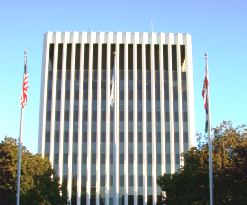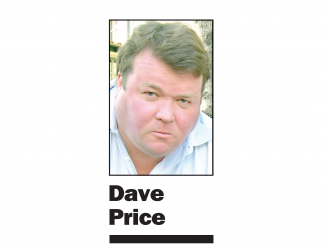
BY SARA TABIN
Daily Post Staff Writer
Palo Alto Mayor Adrian Fine said last night that the economic downturn will force the city will have to make “massive changes,” but City Council’s budget discussion focused on cutting services not laying off employees.
City Manager Ed Shikada said the city might lose $20 million before this year’s fiscal year ends on June 30. He said the city doesn’t know how much revenue it will lose next year but the cuts will likely have to be severe.
He said the city should plan for two years of financial constraints.
Shikada advocated for wide-ranging cuts to “share the pain” without making any permanent changes like selling real estate.
He said the council will have to consider options that are “not attractive.” Shikada said there might be a temptation to assure residents that certain beloved services or projects won’t be impacted, but everything should be on the table as an option for cutting.
Possible cuts include everything from libraries and parking enforcement to tree trimming and not renewing the city’s lease of 27 acres of the Cubberley Community Center from the Palo Alto school district.
Manager, councilman disagree over staffing level
Shikada said the city’s current staffing levels are what he considers to be low — 1,034 full-time employees compared to the 1,058 employees the city had in 2018. He said the city has already been making efficiencies and doesn’t have a lot of excess staff.
Councilman Greg Tanaka said he thinks the city is “top-heavy” and should start with cutting management to prevent loss of services.
Tanaka’s comment came shortly after Shikada said a suggestion from Tanaka that the city’s numbers weren’t properly updated was “inflammatory.”
Councilwoman Alison Cormack said she thinks the city should be as conservative as possible. She said she would rather add services back in if the financial situation improves than have to keep cutting throughout the year.
“It will break my heart to not reopen all five libraries, but everyone’s hearts will be broken,” she said.
Cormack said she thinks the city can’t lose sight of its long-term problems like climate change and rail crossings. She said that stopping progress on paying down pensions would be like deciding to stop bailing a boat when you see a big storm on the horizon.
Councilwoman Liz Kniss said she wants the city to expedite ways for the public to weigh in on the budget.
Fine said at the start of the meeting that the city is hoping to work with the unions to adjust to figure out what sacrifices need to be made.
Union members are getting raises
As the Post reported April 8, members of a number of city unions are scheduled to get raises on July 1 as part of contracts negotiated long before the coronavirus hit. SEIU will get a 2% bump that will cost the city $1.2 million. The police union will get a 3% raise at a cost of $2.2 million. And firefighters will get a 3% hike at a cost of $1.4 million.
Council also discussed putting money toward helping city businesses.
Businesses have been struggling under the state stay at home order. All businesses have been forced to close unless they’re considered “essential” under Gov. Gavin Newsom’s stay-at-home order.
That’s resulted in layoff and, in some cases, decisions by business owners to shut down permanently.
The council said they are interested in putting $500,000 toward grants for businesses with less than 50 employees.
But council hasn’t decided how it will pick the winners. Cormack suggested a lottery.
Tanaka proposed looking at how much different businesses contribute in taxes. He said he wants to get the program going quickly because businesses are struggling to survive.
Councilman Tom DuBois said he wants a slower approach. He said other cities with business bailouts like Mountain View moved to fast and didn’t use their money as well as they could have.
John Shenk, president of Thoits Bros., a landlord to 17 commercial properties downtown, said that if the city wants to help businesses, it should speed up the process of getting permits for such things as signs.




they’re cutting services and union workers are getting raises. Who is running the city?
Tanaka remains the only fiscally responsible individual in PA city government, while Shikada continues in his role as insider union shill. Downright scary.
Temporary pay cuts across the board are needed, not raises.
With sales tax and TOT likely headed toward 0, council needs to be looking at cuts of 25% to 30%. That, unfortunately means layoffs. I realize that firing people is difficult, particularly firing unionized workers, but it’s got to happen. If they wait until June 1, they’ll just dig the hole deeper. Tanaka is right — the city is too heavy. Start by cutting people in administration and work your way down.
Last night the City Manager and staff told the City Council about having to face difficult budgetary choices. Fortunately, their efforts reflect some thoughtful planning amidst a complicated situation.
At the previous week’s Council meeting, all agreed on the importance of reducing toxic air pollution. In the preliminary budget plan presented at this week’s meeting, Mr. Shikada managed to combine some cost-cutting measures with actions that also cut pollution.
For example, the elimination of the (airplane) “travel” budget could, perhaps, save enough money to prevent more than one employee layoff. That’s not millions of dollars, but if it was my job being saved, I’d be appreciative – and the tons of CO2e pollution eliminated, by that one move, will help plenty of people struggling with pulmonary problems.
Money for a new downtown parking garage has been taken off the board. Council spoke of other potential ideas, such increased rates for gigantic water-wasters, and an introduction of parking meters.
Most importantly, I commended the Manager, staff, and Council for implementing a tremendously successful program (in response to the heart-breaking COVID -19 crisis): more than half of our City employees now are working remotely.
Besides the health-promoting reductions in local air pollution, there are several other benefits to the work-from-home arrangement:
Less traffic
Less noise
Less (weather-worsening) atmospheric pollution
Better bicycle safety
Increased worker flexibility re family obligations
Budget savings with rent and/or office utilization
And of course – protection from viral contagion
Plus, isn’t a massive increase in remote meetings and working from home a good thing for the tech industry?
Of course, working from home CANNOT be done by everyone, but we are all witnessing the benefits from the many who can do so, without seeing too many (any?) drawbacks.
With the City in the lead, and with the cooperation of the private sector, we may reach the 80 x 30 goal of Palo Alto’s sustainability plan – 10 years early – IF the City, and its employees, can make this tele-commuting permanent, AND our local businesses and workers do the same as well!!!
If we’ve achieved an 80% reduction in pollution in Palo Alto, and if it’s become “normal” to work from home, to attend Council meetings remotely, or to get tutoring lessons via skype or zoom, WHY GO BACK?
Please encourage the Council to permanently implement these money-saving, pollution-reducing measures!
Thank you,
David Page
Co-Chair of 350SV – Palo Alto team
Hello! [url=https://www.canadianonlinepharmacymlp.com/]online pharmacy tramadol[/url] canadian pharmacy review
Hello! [url=https://www.canadianonlinepharmacymlp.com/]canadian pharmacy cialis[/url] india pharmacy online
Do we really need a mayor, city council and a city manager? I think I found the problem.